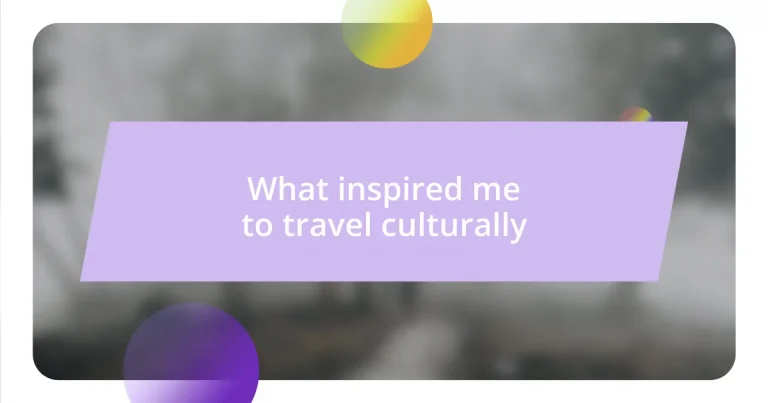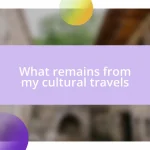Key takeaways:
- Cultural travel fosters deep connections and understanding through shared experiences, such as participating in local traditions and enjoying food together.
- Travel decisions are heavily influenced by cultural aspects like festivals, traditions, and local cuisine, which enrich the overall travel experience.
- Meaningful cultural interactions inspire personal growth, enhance empathy, and ignite creative passions through exposure to diverse perspectives and artistic expressions.
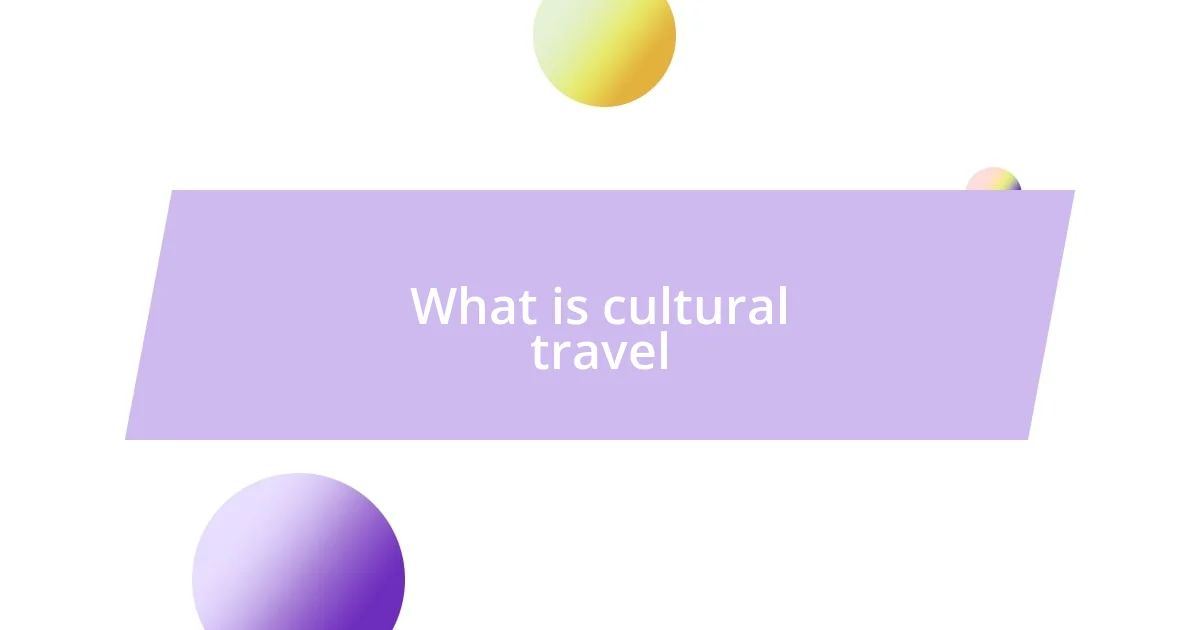
What is cultural travel
Cultural travel is an enriching experience that goes beyond merely visiting new places. It’s about immersing yourself in the traditions, histories, and daily lives of the people you meet along the way. I remember sipping tea with a local family in a small village in Morocco; their warmth and stories painted vibrant pictures of their culture that no guidebook could replicate.
When I think about cultural travel, I often wonder: what do we truly learn when we step outside our comfort zones? Each encounter has the power to challenge our perspectives and broaden our understanding of the world. On a trip to Japan, participating in a tea ceremony opened my eyes to the elegance and precision embedded in their culture, making me appreciate the artistry in everyday rituals.
Ultimately, cultural travel invites us to embrace differences and find commonalities with people from diverse backgrounds. It’s a journey where every person and story has the potential to transform how we view the world. I still reflect on the laughter I shared with street artists in Buenos Aires, a reminder that at the heart of cultural exploration lies the simple joy of human connection.
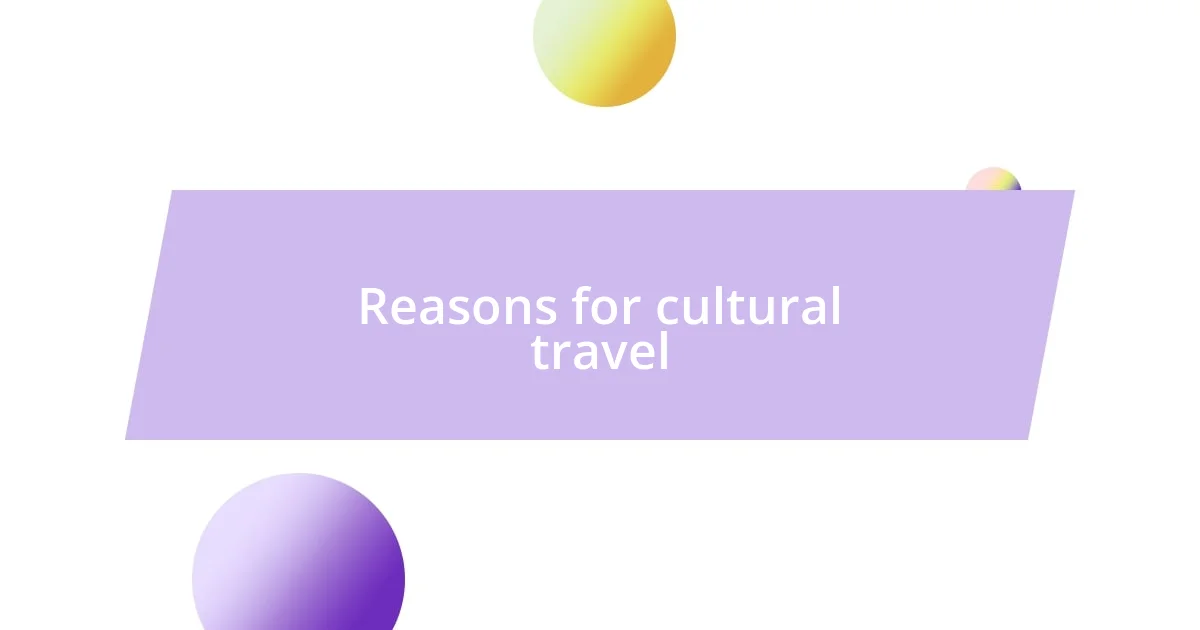
Reasons for cultural travel
Experiencing different cultures opens my eyes to diverse perspectives. When I traveled to India, I was captivated by a vibrant festival where locals decorated the streets with colors and music. Dancing amidst the celebrations, I realized how traditions breathe life into everyday existence, leaving a lasting imprint on my soul.
Here are some reasons why cultural travel is so appealing:
- Connection to Humanity: Engaging with people from varied backgrounds reinforces our shared human experience.
- Personal Growth: Navigating new customs and languages fosters adaptability and confidence.
- Culinary Exploration: Experiencing local cuisine often tells the story of a culture’s history and values.
- Historical Context: Visiting significant landmarks allows us to understand historical narratives in a tangible way.
- Artistic Inspiration: Immersing ourselves in local art scenes can ignite creativity and inspire new ideas.
Each journey reminds me of the richness that cultural travel brings, and it leaves a piece of its essence within me.

How culture influences travel decisions
Experiencing culture has always shaped my travel choices, steering me toward destinations that offer a glimpse into their unique identities. For instance, when I planned a trip to Greece, the thought of exploring ancient ruins steeped in mythology drew me in. Standing at the Acropolis, I felt a profound connection to the stories of the past, making every travel decision infused with excitement and anticipation for the cultural discoveries waiting for me.
Cultural influences often manifest in the way we perceive and engage with a place. During a visit to Peru, I was mesmerized by the vibrant textiles woven by the indigenous communities. Each thread told a story; my heart raced as I learned about their significance and craftsmanship. This motivated me to choose destinations that prioritize cultural heritage, allowing me to appreciate the artistry of human expression.
When we consider how culture shapes our travel choices, it’s fascinating to see the variety of influences at play. For me, the pull of festivals, local traditions, and the chance to share stories over a meal creates a genuine desire to explore further. I recall when I attended a street festival in Mexico City where I danced and laughed with strangers. I had the sense that every trip is not just about seeing sights but about weaving connections and forming memories that enrich our lives.
| Cultural Factor | Influence on Travel Decisions |
|---|---|
| Festivals | Inspire plans based on cultural celebrations, enhancing overall experience. |
| Traditions | Guide choices to destinations that showcase unique customs and practices. |
| Local Cuisine | Attracts travelers eager to explore culinary heritage and authentic flavors. |
| Art and History | Encourages visits to cultural hubs that reflect rich artistic expressions and historical narratives. |
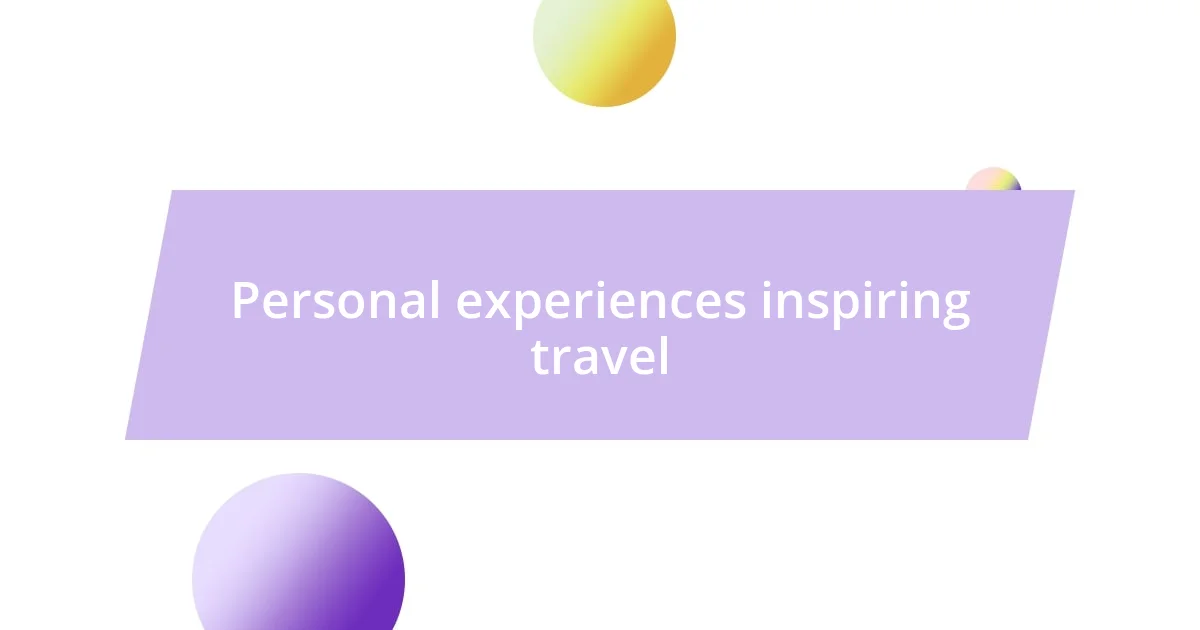
Personal experiences inspiring travel
Reflecting on my travels, there’s a vivid moment in Japan that stands out. I remember standing amidst cherry blossoms in full bloom, surrounded by locals partaking in hanami, the practice of enjoying the beauty of flowers. Watching families share laughter and bento boxes under the delicate petals, I felt a rush of warmth and connection, realizing how important these small moments of joy are in bringing people together.
Another experience that deeply inspired my travels occurred during a volunteer stint in South Africa. Helping at a local community center, I was struck by the resilience and creativity of the children. They taught me to dance and laughed effortlessly, despite facing challenges that would weigh heavily on anyone. Their spirit ignited a passion within me to explore countries where community and hope shine through adversity, making me appreciate the depth of human experience.
Then there was a trip to Italy, where, in a quaint cafe, I struck up a conversation with the owner. He shared stories of his grandmother’s recipes that had been passed down through generations. As I savored a slice of homemade tiramisu, I couldn’t help but wonder: how many tales around the world are tied to a single dish? This realization motivated me to seek culinary adventures wherever I go, as food often tells the most authentic stories of a culture. Each of these experiences has reshaped my understanding of travel, pushing me to seek meaningful connections that go beyond sightseeing.
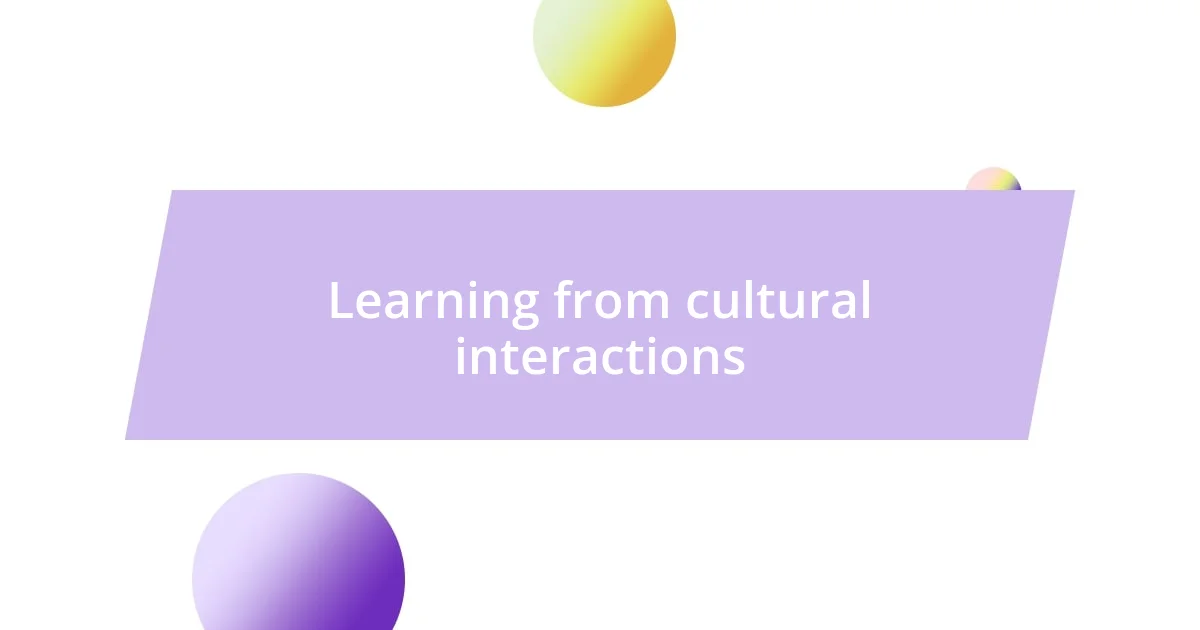
Learning from cultural interactions
Cultural interactions teach us more than just history; they provide a lens into the soul of a community. I remember my time in Morocco, where I shared tea with a local family in their home. The warmth of their hospitality and the laughter we exchanged taught me that travel transcends borders—it’s about finding common ground and creating bonds that span different walks of life. Have you ever taken a moment to think about how these simple interactions can transform your perspective?
In navigating the bustling markets of Istanbul, I was captivated by the artisans, each passionately discussing their craft. Buying a hand-painted ceramic piece, I learned not just about the item’s history but also about the artist’s dreams and struggles. That experience drove home a crucial lesson: every cultural exchange holds a story that adds depth to our own lives. Isn’t it fascinating how an object can harbor such powerful narratives?
Connecting with local customs often sparked deeper reflections within me. One night in Ghana, I joined a drumming circle under the stars, losing myself in the rhythms that echoed through the air. The unity felt in that moment was overwhelming; it reminded me that music is a universal language that can bridge even the largest divides. How often do we let ourselves be swept away by the beauty of shared experiences?
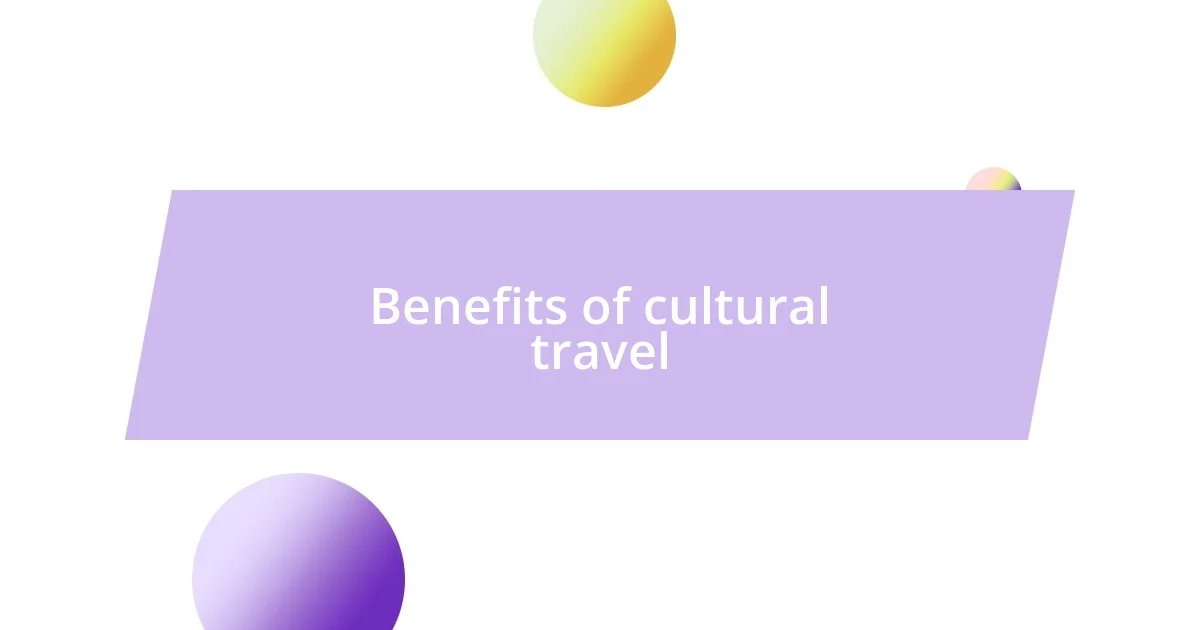
Benefits of cultural travel
Traveling culturally opens doors to profound personal growth. When I visited India, I participated in Festival of Lights, Diwali. It was breathtaking to see the vibrancy of the celebrations and the kindness of families inviting me into their homes. I couldn’t help but feel a deep sense of connection, as if for just a moment, I was part of something larger than myself. This immersive experience revealed the joy of embracing diversity and sparked a desire to learn about traditions beyond my own.
Engaging with different cultures also enhances empathy and understanding. During my time in Mexico, I took part in a traditional cooking class with local women. As we shared stories while preparing dishes, I learned about their joys and struggles, and the importance of family in their lives. It was remarkable how cooking together overpowered language barriers, allowing us to build relationships grounded in mutual respect. Have you ever thought how food can genuinely weave the fabric of human connection?
Another benefit of cultural travel is the inspiration it ignites within us. On my journey through Vietnam, I met local artisans dedicated to preserving their craft. Observing as they effortlessly created intricate silk garments reignited my own creative passions. It’s fascinating how witnessing someone’s commitment can encourage us to pursue our own dreams. Don’t you find it empowering to connect with others who truly live their art? Each encounter helps us see the world through diverse perspectives, enriching our own lives.
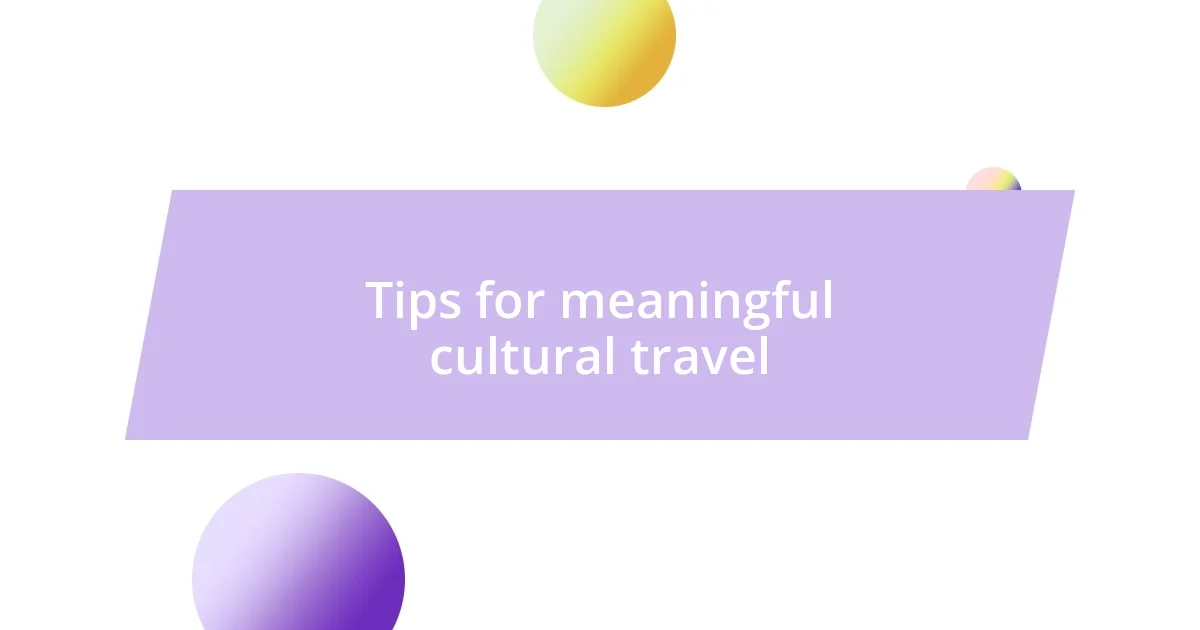
Tips for meaningful cultural travel
Experiencing a country’s culture firsthand is a wonderful way to travel meaningfully. I recall wandering through a village in Peru, where I joined a community gathering. The way everyone came together, sharing stories and food, made me realize how powerful the act of community is in shaping cultural identity. Have you ever felt that sense of belonging, even in a place that’s entirely new to you? It’s remarkable how deeply we can connect with others when we immerse ourselves in their traditions.
To enhance your cultural travels, actively seek local experiences. On a trip to Japan, I was invited to a traditional tea ceremony. Each movement was deliberate, and I felt an overwhelming sense of tranquility. That moment taught me that when we engage with cultural practices, we not only appreciate them—we also open ourselves up to new ways of thinking. Don’t you think that allowing ourselves to slow down and learn from others can lead to incredible personal introspections?
Don’t shy away from asking questions, either. When I visited a small village in South Africa, I was curious about their vibrant beading work. The locals were more than happy to share their techniques and stories, revealing how their craft was tied to their culture’s history. This interaction not only taught me a skill but also deepened my understanding of their heritage. Sometimes, the simplest inquiries can lead to the most profound connections, can’t they?












